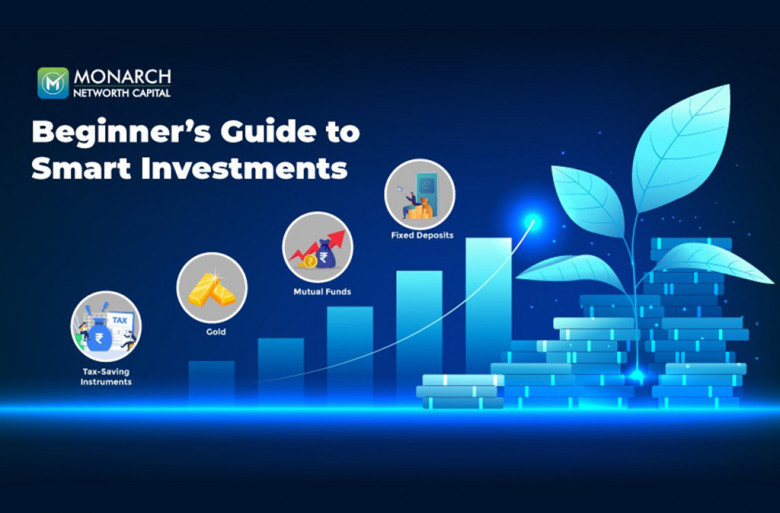views
Smart Investing: A Beginner’s Roadmap
Starting your investment journey can feel overwhelming, especially for beginners — and that's completely understandable. With constant chatter about stock markets and massive returns, many believe that smart investing equals high-risk choices.
However, the reality is different: smart investing is not about chasing the highest returns but about making informed choices that fit your personal goals and risk appetite.
Interestingly, as of 2024, only around 5% of Indians were active in the stock market. So, if you’re feeling unsure, know that you’re in good company! The best part? You can begin with low-risk, beginner-friendly investment options that still help your money grow steadily.

Top Investment Options for Beginners
Here are a few smart choices for those just starting their investment journey:
1. Mutual Funds
Mutual funds are an best investment options for beginners, offering the advantage of professional fund management. Expert fund managers handle asset allocation, stock selection, and timing decisions to align with specific investment goals — whether that’s wealth generation, income generation, or preservation.
Even if you don't fully understand how the stock market works, you can still participate in it through equity mutual funds.
Why Mutual Funds are a Good Starting Point:
-
Systematic Investment Plans (SIPs):
SIPs allow you to invest a fixed sum periodically into a mutual fund of your choice. Starting amounts can be as low as ₹500 monthly. SIPs encourage disciplined investing and harness the power of compounding and rupee-cost averaging, helping smoothen market fluctuations. They are ideal for long-term goals like buying a home or building a retirement fund. -
Diversification:
When you invest in mutual funds, you automatically get exposure to a broad basket of stocks or bonds. This diversification reduces the risk compared to investing in individual securities and optimizes returns. -
Wide Range of Options:
Whether you prefer equity, debt, or hybrid mutual funds, there’s something for every financial objective and risk appetite. Conservative investors, for instance, might choose long-term debt mutual funds focused on government or corporate bonds.
2. Gold
From 1975 to 2025, gold has always been a trusted asset for both new and seasoned investors. It acts as a safeguard during economic uncertainty and historically keeps pace with or even outpaces inflation.
Ways to Invest in Gold:
-
Gold Mutual Funds:
An easy way to gain exposure to gold without physically owning it. -
Sovereign Gold Bonds (SGBs):
Issued by the Reserve Bank of India, SGBs are a secure way to invest. They have an 8-year maturity and offer an annual interest of 2.5%. Plus, if you hold them to maturity, capital gains are tax-free. -
Digital Gold:
Many UPI apps and wallets now allow users to buy small amounts of gold online, which can later be redeemed for cash or physical gold.
3. Fixed Deposits (FDs)
Fixed Deposits are among the most favored investment avenues for beginners. They offer guaranteed returns with zero exposure to market volatility, making them ideal for conservative investors.
You deposit a lump sum for a specified period with a bank or financial institution and earn a predetermined rate of interest. Although FDs typically offer lower returns compared to mutual funds, their stability and predictability make them an excellent choice for building an emergency fund or saving for short-term needs.
4. Tax-Saving Instruments
Certain investments not only help you grow your money but also offer valuable tax benefits.
-
National Pension System (NPS):
A government-supported retirement scheme eligible for deductions under Section 80C, helping you save for your golden years. -
National Savings Certificate (NSC):
Another government-backed option with a five-year lock-in and annual compounded interest, also eligible under Section 80C. -
Public Provident Fund (PPF):
With a 15-year term and EEE (Exempt-Exempt-Exempt) tax status, PPF is ideal for building a substantial, tax-free corpus over time.
Long-Term vs Short-Term Investments: What Suits You?
Different financial goals require different timelines. Some investments are ideal for the short term, while others are best suited for longer horizons.
A balanced investment plan typically includes a mix of both short-term and long-term assets.
Steps to Start Your Investment Journey
Feeling intimidated about where to begin is natural. Here’s a simple five-step guide:
-
Define Your Financial Goals:
Are you saving for short-term dreams (like a vacation) or long-term goals (like retirement)? -
Assess Your Risk Tolerance:
Understand whether you prefer low, moderate, or high-risk investments. -
Start Small:
A small SIP in a mutual fund is a great first step. -
Choose a Trusted Platform:
Select a reliable online trading platform that offers a broad range of investments and educational tools. -
Invest Consistently:
Stay invested through market ups and downs; regular investing leads to long-term success.
Disclaimer: This article is meant for informational purposes only and should not be considered investment advice. Please consult a certified financial advisor before making any financial decisions. Monarch Networth Capital Limited does not guarantee returns or endorse any particular investments mentioned above. Mutual fund investments are subject to market risks. Please read all scheme-related documents carefully before investing.






















Comments
0 comment